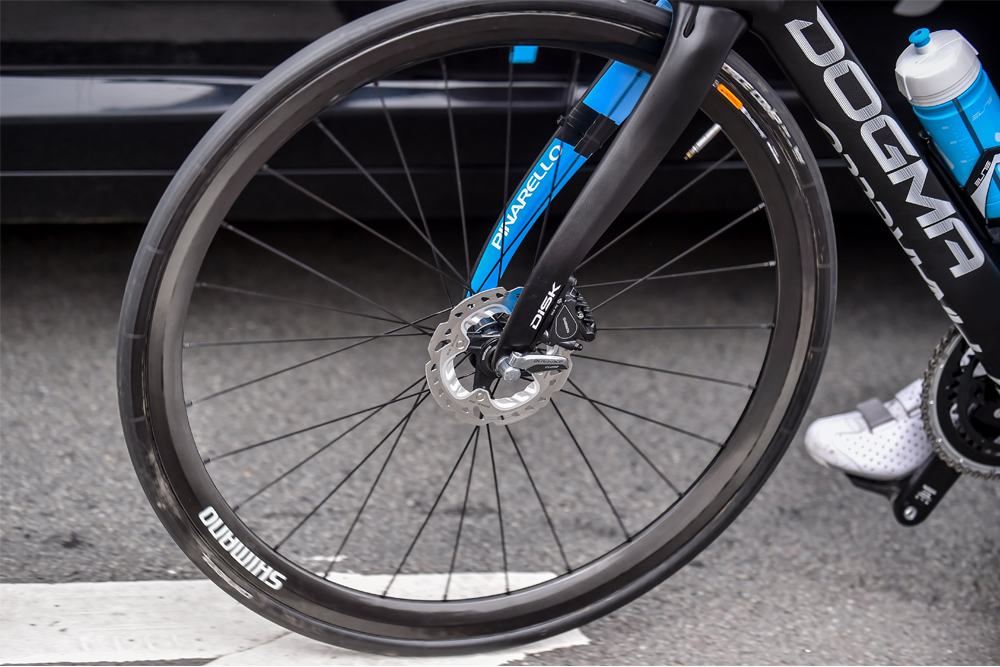Disc brakes in the WorldTour: are they necessary on road bikes?
Shimano and SRAM are right behind the idea of disc brakes on road bikes — but what about everybody else? We weigh up the pros and cons as professional teams begin testing discs in races

The debate over disc brakes is back in the news as teams begin to test them in the professional peloton.
Starting from August all professional teams have been given the option to test disc brakes at two nominated races of their choosing. With several teams yet to run this braking system, we may see some roll out their disc-equipped race machines at the Vuelta a Espana, including Trek Factory Racing.
We saw Team Sky roll out the disc brake equipped Pinarello Dogma F8 at the Eneco Tour, with Bernie Eisel playing guinea pig.

Drop-bar bikes with disc brakes are far from a new idea. Cyclo-cross riders have had them for some time, and for 2015 most major bike brands will have at least one disc-specific road model range, such as Giant’s Defy Advanced, or Specialized’s new Diverge line-up. But with caliper brakes always improving, do road riders really need the compromises that come with a disc brake system?
>>> Pro peloton reacts to disc brakes at Eneco Tour
To begin, let’s look at the three main benefits of disc brakes: power, modulation and all-weather efficiency.
Power
The latest race content, interviews, features, reviews and expert buying guides, direct to your inbox!
Disc brakes, and especially hydraulic disc brakes, do provide substantially more stopping power than rim brakes. However, a rim caliper system fitted with decent brake blocks has more than enough power for a typical rider on a road bike. So the most likely drop-bar bike type that would benefit from disc brakes, solely in terms of needing more pure power, are touring bikes transporting heavy loads.
>>> Disc v rim brakes - the aerodynamic battle (video)
Modulation
Modulation is something that mountain bikers talk about more than road riders. It refers to the ‘feel’ coming through the brake system as a rider applies and releases pressure on the levers. Disc brakes do offer better modulation than rim brakes, but then braking on road descents doesn’t involve quite as much finesse as it does for mountain biking. It’s nice to have, but it’s not a necessity.
>>> Just landed: Genesis Equilibrium Disc Ltd
All-weather assurance
For everyday riders, all-weather ability is a definite boon though. Rims and calipers are a hugely compromised system in the wet, while disc brakes offer very constant performance in all conditions — perfect for British riders especially.
The disadvantages of disc brakes outweigh the advantages; they’re expensive, heavier than caliper brakes, more complicated and raise compatibility issues. Disc wheels are not going to work in your current bikes, and vice versa.
There is also the risk of problems with heat dissipation on long descents. Small discs may not cool down quick enough, heating the hydraulic fluid, and therefore reducing feel and stopping power. However, when they do work well they can offer more stopping power than the tyres can cope with.
>>> Just landed: Wilier GTS Disc
Are these a big enough turn-off to kill the idea of discs on road bikes?
Legendary bike designer Mike Burrows is sure of what conditions are needed for the technology to flourish. “If the pros adopt it, amateur cyclists will want it, too,” he says. “But will pro riders want to be carrying the extra weight up the side of a mountain, just for better braking on the descent? I think not. Most of all pro riders want to go quicker, not stop better.”
Although he’s a fan of disc brakes - see below - Hoy and Pinnacle designer James Olsen sees practical problems with them within the bike industry, too. “The concept of disc brakes on road bikes won’t fail, although take-up between racers and non-racers will vary. It’s clear that standards in terms of disc mounts and axle types will take time to settle. We’ve seen what unsettled standards did for mountain bike sales: some riders got fed up and held off buying a new bike. We’re in a similar situation with the design and spec side of discs on road bikes.”
Our take
The performance benefits of disc brakes, especially in wet weather, are substantial. But then the cost, faff-factor and compatibility are significant handicaps. If anything, we think more riders will opt for a disc-braked road bike for training, commuting and cycle touring. But when it comes to competition we can’t see those feather-light calipers disappearing any time soon.

For: James Olsen - product manager, Hoy and Pinnacle
“Disc brakes on road bikes are all good in my opinion. Anything that helps riders look to bikes with features that may suit them better — bigger tyres, discs, different riding position, etc — is a good thing.
“Discs free up clearances so that the brakes no longer dictate tyre and mudguard sizing. They’re also consistent in any weather and offer great modulation. The fear of losing control through power versus contact patch and grip isn’t my experience, as modulation is so good.”

Against: Philippe Gilbert - pro rider, BMC Racing Team
“For me it is a question of safety. I know in cyclo-cross they use disc brakes, but when we crash we can land on 10 bikes. If you crash and land on a disc, which is warm having braked before the crash, it can open you. Then, if you get it in a vein somewhere…
“You will never have every team on discs, but you couldn’t have some with and some without because that would cause crashes. The ones with discs will brake in 10 metres and the ones without 20 metres.”
The original article by Matt Lamy first appeared in the February 5th edition of Cycling Weekly
Jack Elton-Walters hails from the Isle of Wight, and would be quick to tell anyone that it's his favourite place to ride. He has covered a varied range of topics for Cycling Weekly, producing articles focusing on tech, professional racing and cycling culture. He moved on to work for Cyclist Magazine in 2017 where he stayed for four years until going freelance. He now returns to Cycling Weekly from time-to-time to cover racing, review cycling gear and write longer features for print and online.